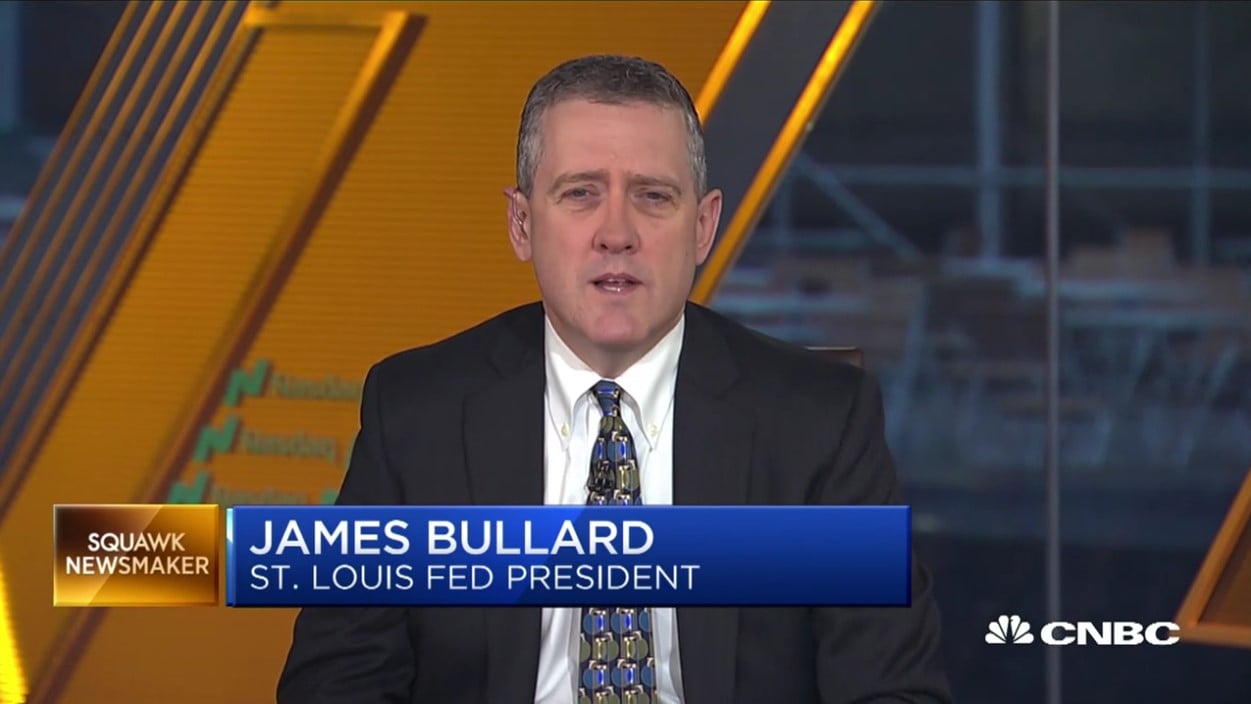CNBC Excerpts: St. Louis Fed President James Bullard Speaks with CNBC’s “Squawk Box” Today
WHEN: Today, Friday, February 21, 2020
WHERE: CNBC’s “Squawk Box”
Q4 2019 hedge fund letters, conferences and more
The following is the unofficial transcript of excerpts from a CNBC interview with St. Louis Fed President James Brian Bullard on CNBC’s “Squawk Box” (M-F 6AM – 9AM.) The following is a link to video from the interview on CNBC.com:
Watch CNBC’s full interview with St. Louis Fed President James Bullard
All references must be sourced to CNBC.
James Brian Bullard on Coronavirus:
If you think that this virus is going to dissipate, and then we're going to have a temporary shock, and everything is going to just go back to normal - I think the Fed is in great shape and we don't have to lower rates in that scenario.
On Soft Landing:
I've been arguing that we're in good shape for a soft landing in the U.S. economy. Tracking estimates of GDP in the first quarter are hanging right around 2%, 2.25%, something like that. So, that sounds to me like, at least as far as the assessment that we can make as of today, we're not going to see a major impact on the U.S.
On Taxing Top Earners:
JAMES BRIAN BULLARD: Here's what worries me as an economist. You're going to take that -- that piece of capital that would otherwise be allocated to some company or something like that –
ANDREW ROSS SORKIN: Well that’s the question --
JAMES BRIAN BULLARD: -- And then you’re going to take it, and what are you going to do with it? What are you going to do with it? If you're going to take it and do something really smart and really great public capital, that might be good. But if you say, ‘I'm going to take that and I'm going to have a party, because I'm going to hand it out to my friends and we're going to have a party,’ that's going to hurt growth.
On Debt Message:
The idea that 60% of GDP is the limit, and that seems to be out the window. Doomsday scenarios about, you know, carrying too much debt don't seem to be working. So, I think as macro-economists, it's incumbent upon us to get more granular and serious about what we're going to say about government debt. Because I think to say the sky is falling all the time hasn't been working.
On Market Valuations:
We always watch this, and we watch financial stability issues and bubble type issues very carefully.
I think the conventional wisdom is that valuations look high, but not at this level of interest rates. And so, to the extent you think this level of interest rates is probably the future, which I've been arguing, I think we're okay for now.
On China Disruptions:
You could make an argument if you had further amplification of the virus in China that it would have major disruption, both on prices and output globally and maybe some of that would feedback to the U.S. But I don't have a real sharp prediction on that.
On U.S. Economy/World Leader:
This is a powerful economy with lots of great market outcomes. There is a role for government. And it is important. But you really want all that innovation that we got over the last 25 years, new products. You don't see that elsewhere in the world. and that's why the U.S. is the world leader.
On Should/Could Big Banks Get Bigger?:
I've not wanted that. I want plenty of competition in the space. So, I like them where they are. Or even smaller.






